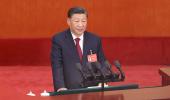US President Joe Biden on Thursday proposed more than $25 billion spending, mostly in the Indo-Pacific region, in particular in the critical infrastructure sector and defence to out-compete China, amid Beijing's increasingly assertive presence in the strategic region.

This includes over $15 billion of proposed investment in the infrastructure sector in the Indo-Pacific and $9 billion for shoring up American defence in the region.
"This Budget cements our commitment to confronting global challenges and keeping America safe. It outlines crucial investments to out-compete China globally and to continue support for Ukraine in the face of unprovoked Russian aggression," Biden said in his message to the Congress.
Biden said it also continues his administration's work to restore America's global leadership -- reviving key alliances and partnerships, strengthening the military, fostering democracy and human rights, protecting global health, honouring the veterans, fixing immigration systems at home, and advancing cybersecurity through implementation of the National Cybersecurity Strategy.
China is the United States' only competitor with both the intent to reshape the international order and, increasingly, the economic, diplomatic, military, and technological power to do it, according to Biden's budgetary proposals sent to the Congress Thursday noon.
During these unprecedented and extraordinary times, the Budget requests both discretionary and mandatory resources to out-compete China and advance American prosperity globally, the White House said.
The Budget includes more than $2.3 billion in discretionary funding for the Department of State and the US Agency for International Development to support an open, secure, and connected Indo-Pacific and implement the Indo-Pacific Strategy to strengthen and modernise America's alliances and partnerships in this vital region, the White House said.
This total includes $90 million for the Association of Southeast Asian Nations and $50 million for the advancement of the Indo-Pacific Economic Framework for Prosperity.
In addition, the Budget expands funding for US diplomatic presence throughout the region, with particular focus on the Pacific Islands.
According to the White House, the mandatory proposal to Out-Compete China will strengthen the US role in the Indo-Pacific and advance the US economy by investing $2 billion to create a new International Infrastructure Fund to support “hard” critical infrastructure.
It proposes another $2 billion to create a new equity revolving fund at the US International Development Finance Corporation to support equity investments; and $2 billion to make game-changing investments in the Indo-Pacific to strengthen partner economies and support their efforts in pushing back against predatory efforts.
As part of this mandatory proposal, the Budget also requests a total of $7.1 billion over the next 20 years for the Compacts of Free Association with the Freely Associated States of the Marshall Islands, Micronesia, and Palau.
The Budget prioritises China as America's pacing challenge in line with the 2022 National Defence Strategy. The Department of Defence's 2024 Pacific Deterrence Initiative highlights USD 9.1 billion of targeted investments the Department is making to US force posture, infrastructure, presence, and readiness as well as efforts to bolster the capacity and capabilities of US allies and partners in the Indo-Pacific region.
Further to assert US leadership in strategic competition with China, the Budget includes $400 million for the Countering PRC Influence Fund.
Further the Budget provides more than $3.4 billion to advance democratic governance and foster democratic renewal globally. The Budget would strengthen free and independent media, fight corruption, bolster democratic institutions, advance technology for democracy, promote gender equality and women's civic and political participation, and defend free and fair elections and political processes.
In the Indo-Pacific, the President has taken action to deepen America's security and economic partnerships to shape the rules of the road and strengthen America's edge in the competition with China - including hosting the first-ever US-Pacific Islands Summit at the White House, it said.
China is engaged in hotly contested territorial disputes in both the South China Sea and the East China Sea. China claims sovereignty over all of the South China Sea. Vietnam, Malaysia, the
Philippines, Brunei and Taiwan have counterclaims.
Beijing has also built up and militarised many of the islands and reefs it controls in the region. Both areas are stated to be rich in minerals, oil and other natural resources and are also vital to global trade.











 © 2025
© 2025